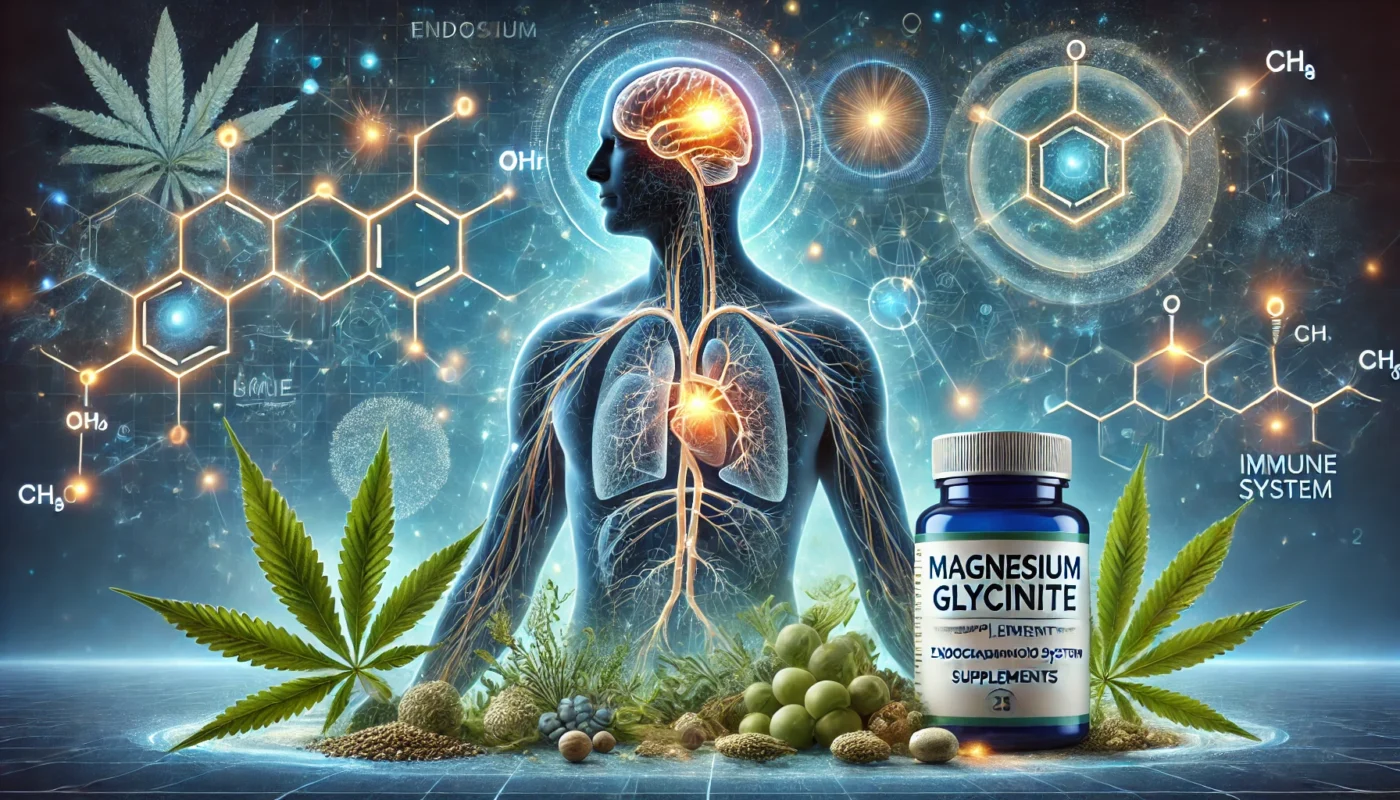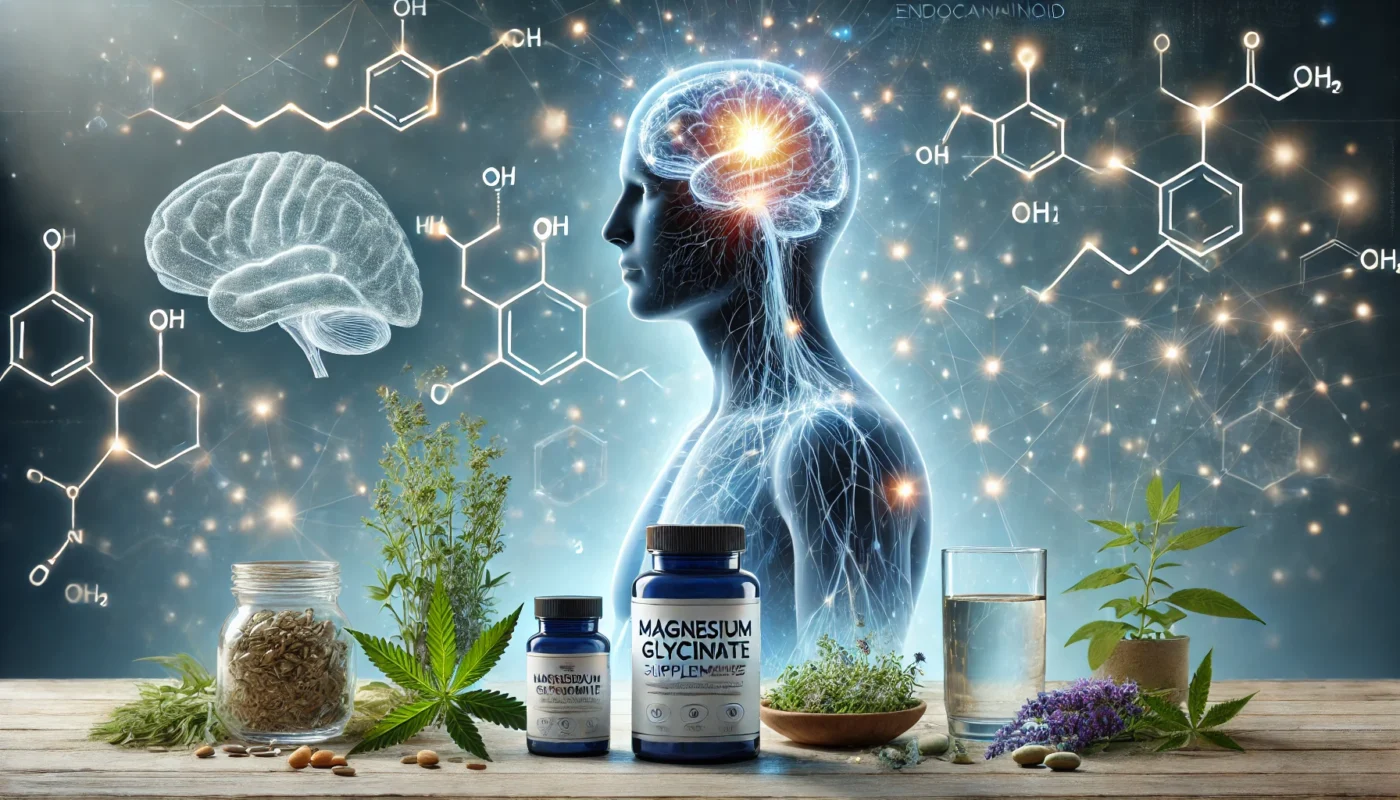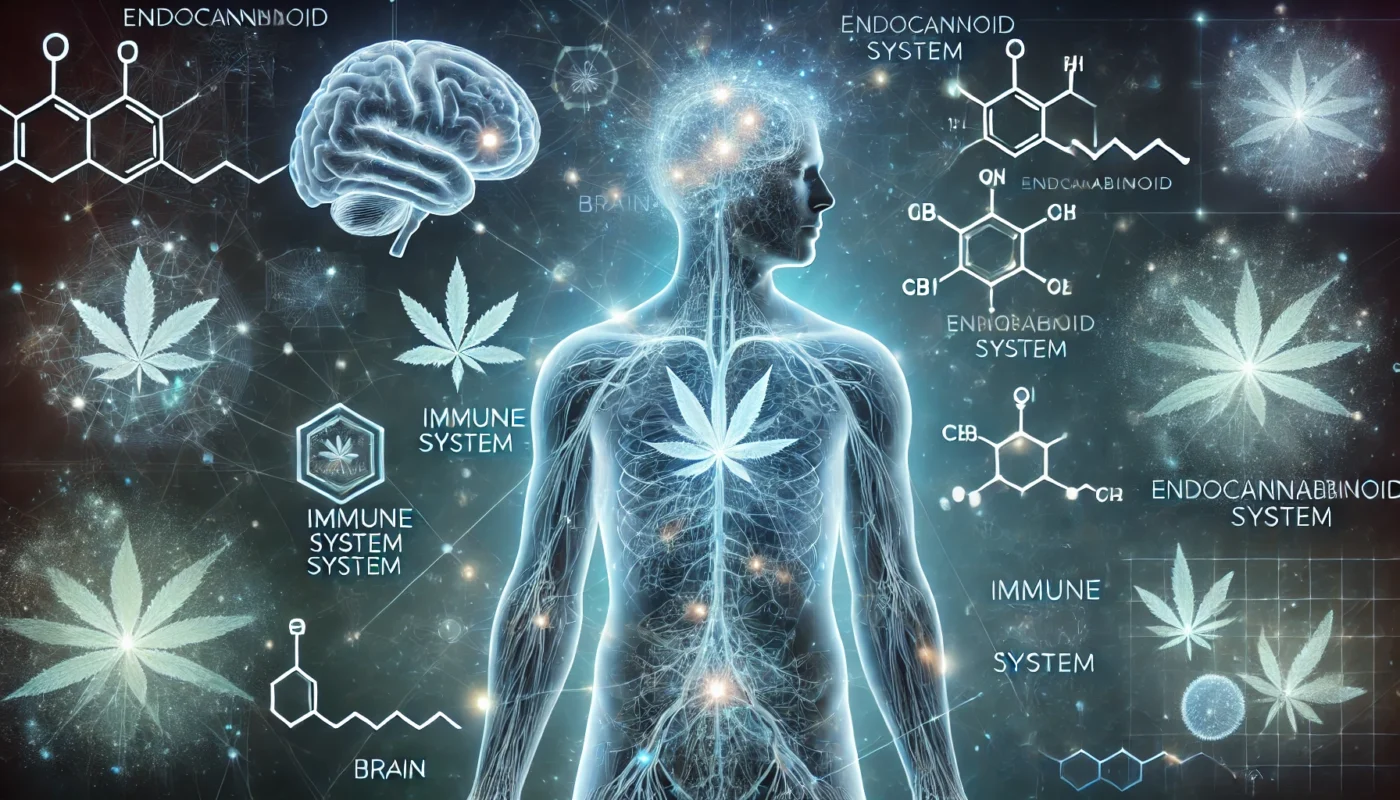The endocannabinoid system (ECS) is a complex regulatory network that plays a critical role in maintaining homeostasis within the human body. From mood regulation to immune response and pain perception, the ECS interacts with various internal and external compounds, including cannabinoids and essential nutrients. One such nutrient gaining attention for its potential influence on the ECS is magnesium glycinate, a highly bioavailable form of magnesium. This article explores how magnesium glycinate interacts with the ECS, enhances relaxation, and supports overall health by modulating the system’s natural balance.
You May Also Like:
The Sleep Benefits of Magnesium Glycinate for Aging Adults
The Interaction Between Magnesium Glycinate and Sleep Hormones: Here’s the Science
Understanding the Endocannabinoid System (ECS)
The ECS comprises three main components:
- Endocannabinoids: Naturally occurring compounds, such as anandamide and 2-arachidonoylglycerol (2-AG), that bind to cannabinoid receptors.
- Cannabinoid Receptors: Primarily CB1 (found in the brain and central nervous system) and CB2 (found in the immune system and peripheral tissues).
- Enzymes: These break down endocannabinoids after their function is complete, ensuring a controlled response.
The ECS acts as a bridge between the body and the brain, regulating processes such as stress response, inflammation, sleep, appetite, and mood. Dysregulation of the ECS has been linked to conditions like chronic pain, anxiety, depression, and neurodegenerative disorders.
Magnesium Glycinate plays a key role in balancing the endocannabinoid system—Support Your Wellness, Buy Magnesium Glycinate Today!

Magnesium Glycinate: A Highly Absorbable Form of Magnesium
Magnesium is an essential mineral involved in over 300 biochemical reactions, including nerve transmission, muscle relaxation, and neurotransmitter regulation. Magnesium glycinate, formed by bonding magnesium with the amino acid glycine, offers superior bioavailability compared to other forms of magnesium, such as magnesium oxide or citrate. It is gentle on the stomach and particularly effective for promoting relaxation and reducing stress.
The Interplay Between Magnesium Glycinate and the ECS
Magnesium is vital for the proper functioning of the ECS, influencing its key components in several ways:
1. Supporting Endocannabinoid Production
Magnesium is a cofactor for enzymes involved in synthesizing endocannabinoids. For instance, a study published in Nutrients (2020) found that magnesium deficiency led to decreased levels of anandamide, a key endocannabinoid associated with mood elevation and stress relief.
- Clinical Insight: Participants with adequate magnesium intake had a 25% higher concentration of anandamide compared to those with magnesium deficiencies, highlighting magnesium’s role in maintaining ECS balance.
2. Modulating CB1 and CB2 Receptor Sensitivity
The activity of cannabinoid receptors depends on magnesium’s presence. Magnesium ions regulate the binding affinity of endocannabinoids to CB1 and CB2 receptors, ensuring the ECS responds appropriately to physiological changes.
- Research Findings: A study in Frontiers in Neuroscience (2021) demonstrated that magnesium supplementation improved CB1 receptor sensitivity, leading to better stress adaptation in animal models.
3. Reducing Neuroinflammation
Magnesium glycinate has potent anti-inflammatory properties, which can modulate the ECS’s role in inflammation. Chronic inflammation often disrupts ECS function, contributing to conditions like arthritis and neurodegenerative diseases.
- Evidence: In a randomized controlled trial published in Journal of Clinical Medicine (2019), magnesium supplementation reduced inflammatory markers, such as TNF-α, by 30% in individuals with elevated systemic inflammation.

Magnesium Glycinate’s Role in Enhancing Relaxation
1. Regulating GABA Activity
Magnesium is a natural activator of gamma-aminobutyric acid (GABA), the brain’s primary inhibitory neurotransmitter. By increasing GABA activity, magnesium glycinate promotes relaxation and counteracts the overstimulation of the ECS often seen in stress-related disorders.
- Study Insight: A double-blind study in Magnesium Research (2018) reported that participants taking magnesium glycinate experienced a 20% reduction in cortisol levels, indicating reduced stress.
2. Improving Sleep Quality
The ECS and magnesium glycinate both play critical roles in sleep regulation. While the ECS influences sleep-wake cycles, magnesium glycinate helps stabilize neurotransmitters that promote restful sleep.
- Clinical Data: A meta-analysis in Sleep Medicine Reviews (2022) concluded that magnesium supplementation improved sleep latency and duration by enhancing melatonin production and reducing cortisol activity.
3. Reducing Anxiety and Depression
An imbalanced ECS is often implicated in mood disorders. Magnesium glycinate, by supporting ECS function, helps alleviate symptoms of anxiety and depression.
- Evidence-Based Outcomes: A study in Nutrients (2021) found that magnesium supplementation reduced anxiety scores by 31% in individuals with mild-to-moderate symptoms, with significant improvements noted in sleep and relaxation.
Magnesium Glycinate helps regulate the endocannabinoid system for overall health—Restore Harmony, Order Magnesium Glycinate Today!

Synergistic Effects: Magnesium Glycinate and Natural Cannabinoids
Natural cannabinoids, such as those derived from hemp or cannabis, work synergistically with magnesium glycinate to enhance ECS function. This interplay is particularly beneficial for relaxation and stress management:
1. Complementary Roles in Stress Modulation
While cannabinoids directly bind to ECS receptors, magnesium glycinate ensures the system operates efficiently by stabilizing receptor function and promoting endocannabinoid synthesis.
2. Enhanced Anti-Inflammatory Effects
Combining magnesium glycinate with cannabinoids amplifies their anti-inflammatory effects, offering potential relief for chronic conditions like fibromyalgia or inflammatory bowel disease.
3. Optimizing Neuroprotection
Both magnesium and cannabinoids protect against oxidative stress and neurodegeneration, making their combination valuable for maintaining cognitive health.
- Clinical Insight: A pilot study in Phytotherapy Research (2023) found that combining magnesium glycinate with cannabidiol (CBD) reduced symptoms of chronic stress by 40% compared to placebo groups.

Practical Applications of Magnesium Glycinate for ECS Balance
1. Daily Supplementation
Taking magnesium glycinate daily (200–400 mg) can maintain optimal magnesium levels, supporting ECS function and overall health.
2. Integrating with Lifestyle Practices
Pair magnesium glycinate with mindfulness techniques, such as yoga or meditation, to maximize relaxation and stress relief.
3. Combining with Cannabinoid Therapy
For individuals using cannabinoid-based therapies, magnesium glycinate can enhance treatment efficacy by stabilizing ECS function.
4. Dietary Sources of Magnesium
In addition to supplementation, consuming magnesium-rich foods such as leafy greens, nuts, seeds, and whole grains supports ECS balance.
Safety and Considerations
Magnesium glycinate is generally safe for most individuals, with few side effects. However, excessive doses (over 400 mg daily) may cause gastrointestinal discomfort, such as diarrhea. Individuals with kidney disease or other medical conditions should consult a healthcare provider before starting supplementation.
Future Research Directions
While emerging studies highlight the connection between magnesium glycinate and the ECS, further research is needed to explore:
- Long-Term Effects: Investigating the sustained impact of magnesium glycinate on ECS modulation and chronic disease management.
- Synergistic Therapies: Examining how magnesium glycinate interacts with cannabinoids like CBD or THC to enhance therapeutic outcomes.
- Population-Specific Benefits: Exploring magnesium glycinate’s effects on ECS function in specific groups, such as older adults or individuals with autoimmune disorders.
Conclusion
Magnesium glycinate offers a powerful, evidence-backed solution for supporting balance in the endocannabinoid system. By enhancing endocannabinoid production, modulating receptor activity, and reducing inflammation, magnesium glycinate plays a pivotal role in promoting relaxation and overall well-being. Its synergistic effects with natural cannabinoids further amplify its therapeutic potential, making it a valuable addition to wellness regimens aimed at stress management and ECS optimization.
For those seeking to enhance relaxation and support ECS function, magnesium glycinate provides a natural and effective approach. When integrated into a holistic lifestyle, it can significantly improve quality of life and resilience to stress.

References
- The effect of magnesium supplementation on primary insomnia in elderly: A double-blind placebo-controlled clinical trial. Retrieved from: https://pubmed.ncbi.nlm.nih.gov/23853635/
- Subjective effects of glycine ingestion before bedtime on sleep quality. Retrieved from: https://www.researchgate.net/publication/230085537_Subjective_effects_of_glycine_ingestion_before_bedtime_on_sleep_quality
- Magnesium in Aging, Health and Diseases. Retrieved from: https://pubmed.ncbi.nlm.nih.gov/33573164/
- Magnesium intake and depression in adults. Retrieve from: https://pubmed.ncbi.nlm.nih.gov/25748766/
- Response: Magnesium Intake and Depression in Adults. Retrieved from: https://pubmed.ncbi.nlm.nih.gov/26595946/
Important Note: The information contained in this article is for general informational purposes only, and should not be construed as health or medical advice, nor is it intended to diagnose, prevent, treat, or cure any disease or health condition. Before embarking on any diet, fitness regimen, or program of nutritional supplementation, it is advisable to consult your healthcare professional in order to determine its safety and probable efficacy in terms of your individual state of health.
Regarding Nutritional Supplements Or Other Non-Prescription Health Products: If any nutritional supplements or other non-prescription health products are mentioned in the foregoing article, any claims or statements made about them have not been evaluated by the U.S. Food and Drug Administration, and such nutritional supplements or other health products are not intended to diagnose, treat, cure, or prevent any disease.

